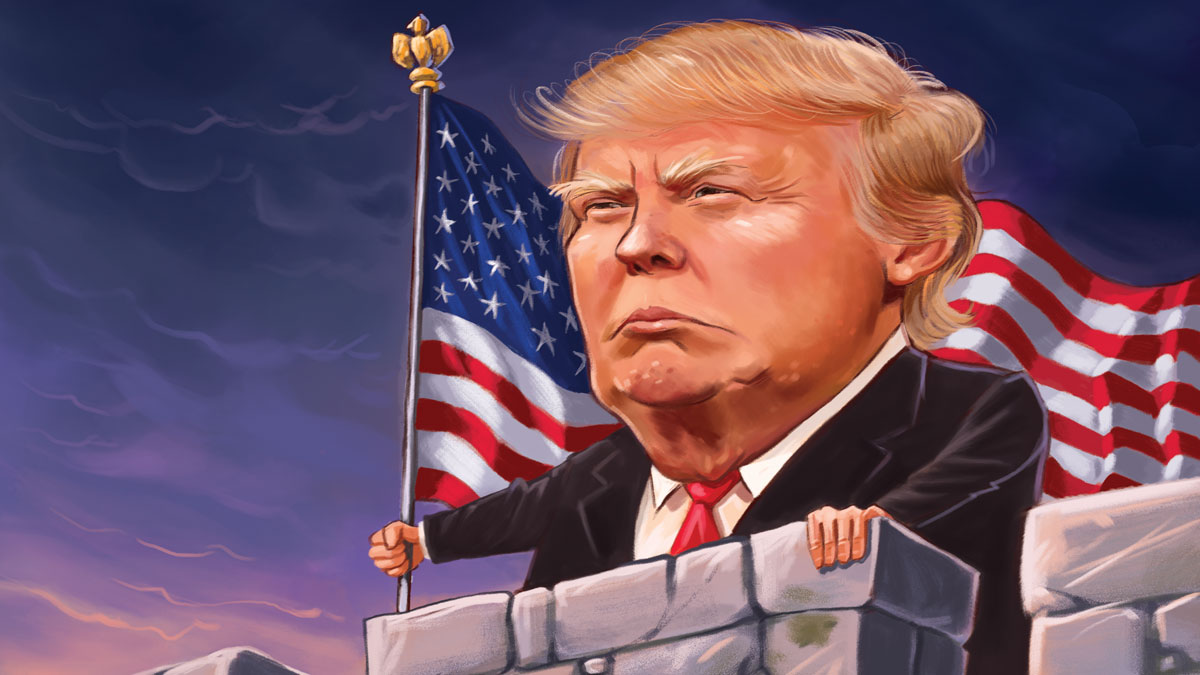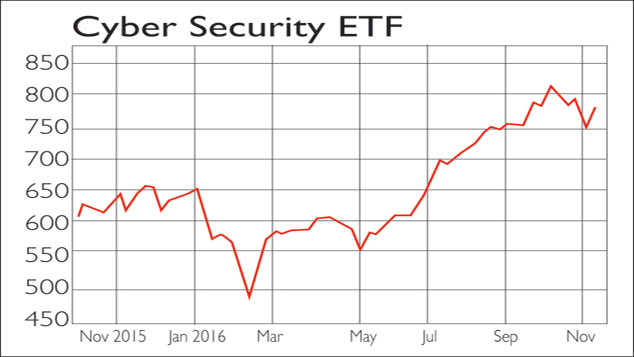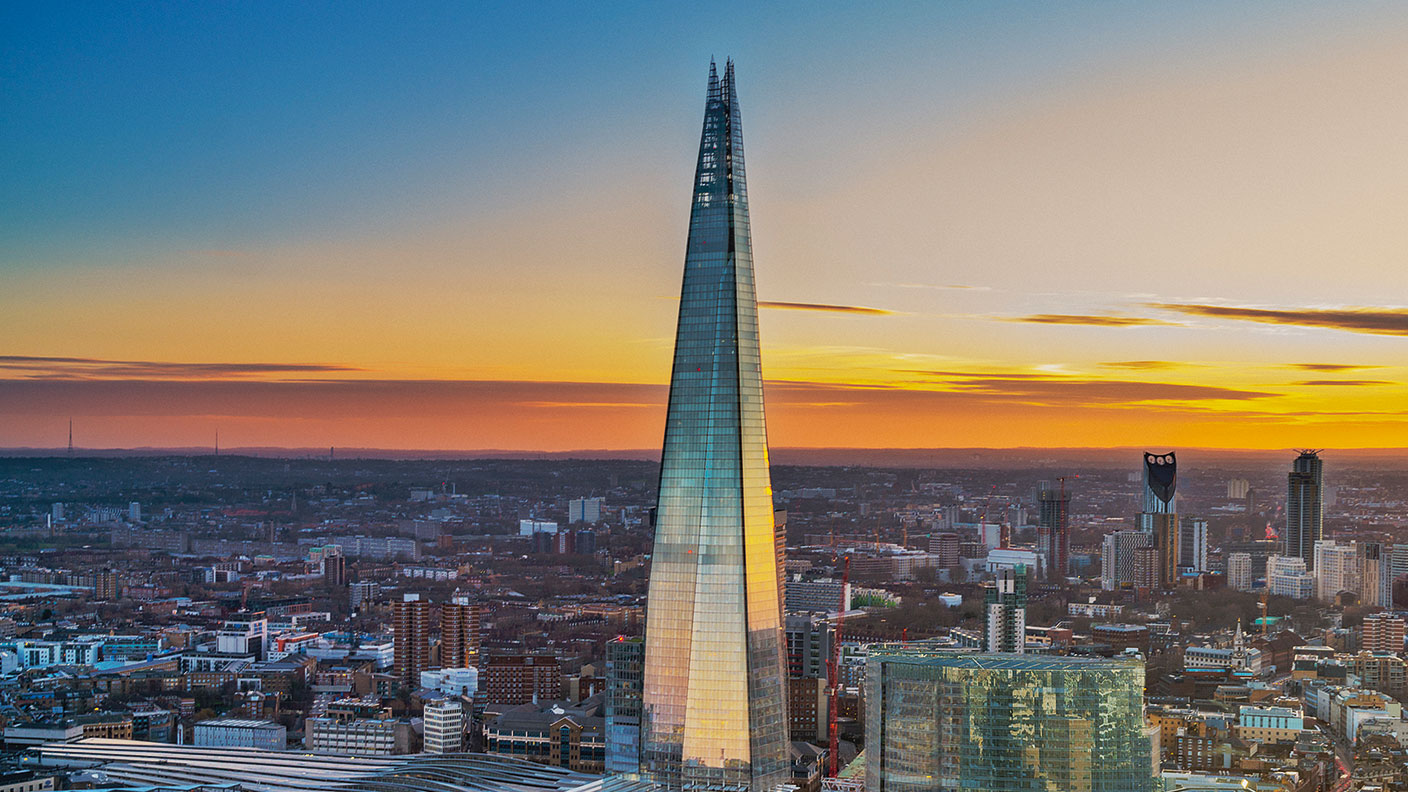Fortress America: will Trump splurge on security?
Donald Trump wants to “make America safe again”, so expect a spending surge on an already dysfunctional arm of government. But there is an upside for investors, says Jonathan Compton.
Get the latest financial news, insights and expert analysis from our award-winning MoneyWeek team, to help you understand what really matters when it comes to your finances.
You are now subscribed
Your newsletter sign-up was successful
Want to add more newsletters?

Twice daily
MoneyWeek
Get the latest financial news, insights and expert analysis from our award-winning MoneyWeek team, to help you understand what really matters when it comes to your finances.

Four times a week
Look After My Bills
Sign up to our free money-saving newsletter, filled with the latest news and expert advice to help you find the best tips and deals for managing your bills. Start saving today!

Donald Trump wants to "make America safe again", so expect a spending surge on an already dysfunctional arm of government. But there is an upside for investors, says Jonathan Compton.
Leaders on the election trail often promise to cut excessive government interference. But once elected, they find power is simply too enjoyable to relinquish. This seems a particularly pertinent point in the wake of Donald Trump's victory in the US presidential election. The position of US president has long been among the most powerful in the world. But since the terrorist attack on the World Trade Center in September 2001, US presidents have been given further, enormous covert powers, which have been little noticed. The question is, given his stated desire to crack down on illegal immigration and "make America safe again", what might Trump do with them?
In 2002, the understandably panic-stricken US administration undertook the greatest re-organisation of federal government departments since 1947. The Department of Homeland Security (DHS) combined 22 of the most important security agencies (of a total of 187), aiming to put an end to the errors and lack of coordination that had enabled the September 11th attackers to succeed.
MoneyWeek
Subscribe to MoneyWeek today and get your first six magazine issues absolutely FREE

Sign up to Money Morning
Don't miss the latest investment and personal finances news, market analysis, plus money-saving tips with our free twice-daily newsletter
Don't miss the latest investment and personal finances news, market analysis, plus money-saving tips with our free twice-daily newsletter
The FBI, the coastguard, airport security (the cash-strapped airlines couldn't afford to check passengers), railway stations and bus terminals, border control, immigration, cybercrime, and even natural disaster relief, all were put under the control of the new DHS mega-department. With more than 250,000 employees (more than the UK's total armed forces) and a budget this year of $64bn, it is the third-largest US government department by size.
Almost from its creation, the DHS has demonstrated incompetence on a heroic scale in terms of carrying out its mandates or improving national security. One problem is its structure. Rather than integrating the myriad departments, the DHS simply imposed further layers of management. Staff morale is appalling. Of the 36 major federal departments, the DHS consistently ranks in the bottom tenth on personnel management, quality of leadership, job satisfaction and transparency. Staff turnover is twice the government average.
Senior government officials and political appointees have frequently altered or hidden documents to deceive Congress, or changed statistics to provide a more favourable impression. Yet oversight of the DHS is weak. More than 90 congressional committees and subcommittees have some jurisdiction over parts of it three times as many panels as oversee the much larger Pentagon but none has a broad overview.
This is left to two independent overseers (the lowest oversight of any government department): the Office of Inspector General, which in 2014 significantly altered damning findings in its official report to Congress; and the Office for Civil Rights and Liberties, whose often critical reports are ignored. Thus, in practice, a department with 55,000 armed officers essentially a nascent paramilitary at the disposal of the president lacks any meaningful controls.
A litany of failure
Financial controls are almost non-existent too. External independent auditor KPMG found itself unable to express an opinion on its accounts for six of the first ten years of the DHS's existence (in lay terms, the books were cooked), only signing a clean audit from 2013 after the remit was narrowed to an overview of headline numbers, without seeing the underlying details. A congressional oversight report by Senator Tom Coburn stated that the DHS had failed in the execution of all five of its key functions and that there was no evidence that $50bn-worth of counterterrorist programmes over 11 years had in any way improved the nation's security.
Other examples of misspending include a failed $600m programme to track visitor departures, or the $400m spent on purchasing body scanners for airports, which when tested were found to be largely ineffective (they have since been replaced with new but untested versions). As for one of Trump's favourite projects, the wall along the Mexican border, the DHS had been planning for such walls at a cost of $1m to $7m per mile, depending on terrain, long before he became president-elect. That's on top of the near-$500m already spent on a virtual border wall (cameras, heat sensors, laser trip beams and other toys for boys) along part of the 700 miles of border which is not monitored. That programme was scrapped after repeated failures.
Perhaps that's no surprise 14 years on from its creation, the DHS is still floundering around trying to construct its own HQ, never mind a wall. Its various agencies are spread across more than 50 centres, some of them up to 200 miles from Washington, so the original target for an HQ was for a giant new 180-acre campus in Washington DC to open by 2015 at a cost of $3.9bn.
Only when the target was "extended" to 2026, with costs rising to more than twice the original estimates, did various oversight committees try to bring in some controls, many patently potty such as catering for 18,000 staff with only 12,000 desks. Around half of the offices that were set to be moved to the new HQ will now remain in their distant premises. Yet because of the inordinate delays involved, some, such as the FBI's HQ, are physically falling down. Meanwhile, the DHS has also spent more than $200m over the last decade to investigate why staff morale is so low.
On a day-to-day, operational basis, the DHS's failures are legion. The Transport Security Administration (TSA), which oversees airport security, is woeful. Checks have shown that the smuggling of guns, knives and other dangerous items through air and sea ports has a tiny detection rate.
Two years ago it was discovered that the TSA had 73 employees on the terror watch list who had evaded its less-than-rigorous internal checks because other departments had refused the TSA access to the necessary data, even though a key purpose of the DHS was better departmental co-ordination. As one congressman noted wryly, "terrorist employees have to report themselves in order to be caught".
Critically, for a department that depends so much on data collation and analysis, the DHS's cybersecurity is a mess. Another investigation found more than 100 unauthorised computers containing reams of classified information but not controlled by anyone and lacking even basic passwords. Most of the 22 sub-departments have different computer systems, so many are unable to talk to each other, or access each other's data. Some are still using software such as Microsoft Windows Server 2008, which is no longer updated and for which the company will cease all support within three years.
Trump's campaign benefited from similar popular concerns as Brexit, such as a fear of uncontrolled immigration, and the DHS produces plenty of data on the numbers caught and repatriated. But the reality is that it catches just 3% or so of those crossing the border illegally. Meanwhile, its agents have frequently been found guilty of physical and sexual abuse and serious human rights breaches, while the bizarre and probably unconstitutional regulations on who is allowed to fly have been described by senior judges as "Kafkaesque".
A disturbing level of mission creep
The DHS's profligacy and incompetence is striking, even by government standards. But more worrying still is the absence of clarity as to its actual purpose. The department's mission statements vary from year to year. Here's the current one: "With honour and integrity, we will safeguard the American people, our homeland and our values." That's about as vague as it gets. This opacity combined with its huge budget has seen the DHS embark on an astonishing level of mission creep.
In practice it has a vast paramilitary wing, with hundreds of armoured vehicles, the second-largest fleet of (currently) unarmed drones in the world, and through its 80-plus Fusion Centers jointly established with the Department of Justice it now exerts extraordinary power at both state, county and local level. These centres were set up to coordinate better policing, intelligence and law enforcement. In practice, the DHS funds, staffs and thus controls each one while pouring in heavy-duty military hardware and software that should never be in the hands of relatively low-grade police forces.
Fusion Centers are almost entirely free of political or judicial oversight and enjoy powers that would have been the envy of the Spanish Inquisition. Operating within a bubble of paranoia, the DHS is tailor-made for a president to use without oversight. All aspects of private and corporate life are now seen as breeding grounds for grave security threats. Heavily armed SWAT squads are sent out every year to the most improbable places: to barber shops and liquor stores for failing to have the right licences; to factories to seize fake branded products; to offices supporting gay escort websites.
Both pro- and anti-abortion activists have been monitored, and put onto terrorist databases, as have legal, peaceful religious lobby groups. Many DHS officials are immune or operate as if they were from requirements for warrants or legal process, resulting in a huge rise in arrests and arbitrary seizures of private property.
Incompetent, inefficient and wasteful, the DHS is a failed experiment that has probably put America more at risk from overseas threats than before. It should be broken up into manageable, independent units with a logical fit such as combining the coastguard with the border service. As for cybersecurity, separate federal agencies such as the National Security Agency should be used to collect and disseminate information.
But will it happen? There widespread awareness that the DHS is a mess. Yet few politicians dare step up for fear of being branded unpatriotic. Meanwhile, the vast majority of citizens who are peaceful and law abiding are increasingly subject to a level of state coercion and control far higher than during the delusional McCarthy communist-hunting era. To extrapolate this into a dystopian future is premature.
Yet imagine how the DHS might have been used under a malicious, dishonest president such as Richard Nixon. We do not know if "The Donald" will use the DHS's extraordinary powers. But given his desire to spend more on "protecting" America and putting up borders, we won't hold our breath for the DHS's budget to be cut. Below we look at one specific defence sector likely to benefit cybersecurity.
The cybersecurity stocks to buy now
In terms of increased defence spending, regardless of what Trump does with the DHS, one area that's likely to benefit is the need to fight cybercrime, be it terrorist-related or simple online banditry of the sort Tesco Bank customers recently experienced. Hence investment opportunities abound among the many companies offering cybersecurity, computer defence systems and anti-viral gizmos.
The easiest and cheapest play is the London-listed Cyber Security ETF (LSE: ISPY) managed by the American firm Pure Funds, which tracks the performance of companies primarily involved in the cybersecurity business.

For investors looking for specific stocks, the UK has only a handful with decent business models. Two are interesting. The first is Sophos (LSE: SOPH), which listed early in 2015 and now has a market cap of £1bn. The main product is its central platform, offering "unified threat management" many systems only target specific threats, whereas this looks to cover the field and is priced to be used by medium-sized and smaller businesses. Analysts are concerned over an increase in deferred revenue (unpaid invoices), but I particularly like the rapid growth in its free cash flow and net cash.
And 2017 should see a true maiden profit, so although it trades on 25 times forward earnings, I believe the recent results justify this. A stronger performer has been Aim-listed Cohort (LSE: CHRT), which manages IT contracts for the UK's Ministry of Defence and operates widely in electronic warfare support and cyber defence consultancy. It has just announced a sensible restructuring to reduce costs and preserve profit margins. I like the steady growth in revenue and earnings, which justify the 20 times multiple.
Internationally there are many large players, such as Israel-based Check Point Software (Nasdaq: CHKP), now valued at $15bn. It sells various technology and security products to business and the military, and has a range of packages to prevent cyber intrusion it is one of the few firms to offer total security cover from a single source. Also US-listed is the $7bn Leidos Holdings (Nasdaq: LDOS), an applied tech company providing tailor-made products for clients in intelligence, surveillance and cybersecurity.
In October it won a major contract from the DHS following previous wins from the US army and large defence companies. As such, it looks like a beneficiary from the rise in high-profile attacks. On a 12 times multiple and a 16% return on equity, it looks under-priced.
Lastly, Japan's more pedestrian Trend Micro (Tokyo: 4704) designs and sells security-related software. It has developed a strong niche in "cloud security", where risks of attack are higher than on conventional, older networks. Last year revenue rose but profits fell, largely due to higher research costs the price of being in a fast-moving business. A good recovery is expected in 2017.
Get the latest financial news, insights and expert analysis from our award-winning MoneyWeek team, to help you understand what really matters when it comes to your finances.
Jonathan Compton was MD at Bedlam Asset Management and has spent 30 years in fund management, stockbroking and corporate finance.
-
 Last chance to invest in VCTs? Here's what you need to know
Last chance to invest in VCTs? Here's what you need to knowInvestors have pumped millions more into Venture Capital Trusts (VCTS) so far this tax year, but time is running out to take advantage of tax perks from them.
-
 ISA quiz: How much do you know about the tax wrapper?
ISA quiz: How much do you know about the tax wrapper?Quiz One of the most efficient ways to keep your savings or investments free from tax is by putting them in an Individual Savings Account (ISA). How much do you know about ISAs?
-
 Governments will sink in a world drowning in debt
Governments will sink in a world drowning in debtCover Story Rising interest rates and soaring inflation will leave many governments with unsustainable debts. Get set for a wave of sovereign defaults, says Jonathan Compton.
-
 Why Australia’s luck is set to run out
Why Australia’s luck is set to run outCover Story A low-quality election campaign in Australia has produced a government with no clear strategy. That’s bad news in an increasingly difficult geopolitical environment, says Philip Pilkington
-
 Why new technology is the future of the construction industry
Why new technology is the future of the construction industryCover Story The construction industry faces many challenges. New technologies from augmented reality and digitisation to exoskeletons and robotics can help solve them. Matthew Partridge reports.
-
 UBI which was once unthinkable is being rolled out around the world. What's going on?
UBI which was once unthinkable is being rolled out around the world. What's going on?Cover Story Universal basic income, the idea that everyone should be paid a liveable income by the state, no strings attached, was once for the birds. Now it seems it’s on the brink of being rolled out, says Stuart Watkins.
-
 Inflation is here to stay: it’s time to protect your portfolio
Inflation is here to stay: it’s time to protect your portfolioCover Story Unlike in 2008, widespread money printing and government spending are pushing up prices. Central banks can’t raise interest rates because the world can’t afford it, says John Stepek. Here’s what happens next
-
 Will Biden’s stimulus package fuel global inflation – and how can you protect your wealth?
Will Biden’s stimulus package fuel global inflation – and how can you protect your wealth?Cover Story Joe Biden’s latest stimulus package threatens to fuel inflation around the globe. What should investors do?
-
 What the race for the White House means for your money
What the race for the White House means for your moneyCover Story American voters are about to decide whether Donald Trump or Joe Biden will take the oath of office on 20 January. Matthew Partridge explains how various election scenarios could affect your portfolio.
-
 What’s worse: monopoly power or government intervention?
What’s worse: monopoly power or government intervention?Cover Story Politicians of all stripes increasingly agree with Karl Marx on one point – that monopolies are an inevitable consequence of free-market capitalism, and must be broken up. Are they right? Stuart Watkins isn’t so sure.